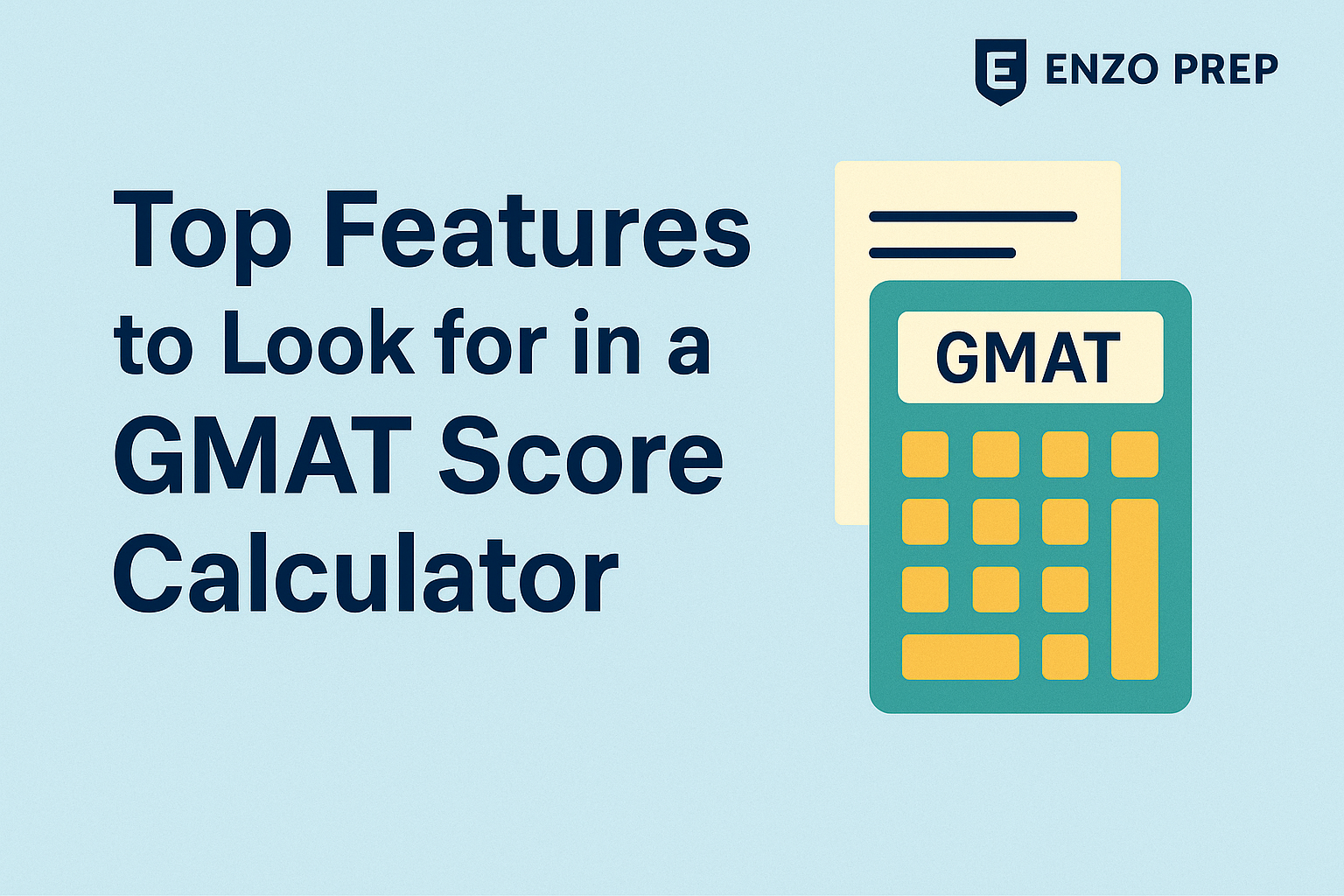Preparing for the GMAT can be a challenging journey, and knowing where you stand throughout your study process is crucial. A reliable GMAT score calculator can be invaluable for estimating your potential score, understanding your strengths and weaknesses, and setting goals. These calculators allow you to self-assess, adjust your strategies, and stay on track. In this guide, we’ll explore the essential features of a GMAT score calculator, including online options, tools for GRE to GMAT conversions, and the importance of section-specific scoring. With these insights, you can select a calculator that meets your needs and supports your target GMAT score.
What is a GMAT Score Calculator?
Understanding the Role of a GMAT Score Calculator
A GMAT score calculator estimates your score based on the number of correct answers and relative performance across different sections. It provides insights into how well you’re performing in each area—Quantitative, Verbal, Integrated Reasoning, and Analytical Writing—so you can better direct your preparation efforts. For students aiming for competitive scores, this can be a time-saving tool, allowing you to adjust study plans based on real data.
Key Advantages of Using a GMAT Score Calculator Online
Using an online GMAT score calculator offers fast, convenient results that can guide your study sessions in real-time. Many calculators allow you to get immediate feedback and track your progress over time, which is especially useful for self-prepared test-takers. An online tool with well-designed algorithms can reveal patterns in your scores, helping you target the areas that need the most attention.
Essential Features to Look for in a GMAT Score Calculator
Accurate Section Scoring Algorithms
When evaluating a score calculator, check whether it accurately calculates section-specific scores for Quantitative and Verbal sections. A quality calculator should reflect the scoring system used by the GMAT, with accurate estimations for each section, even as difficulty levels change. Tools that follow official scoring guidelines, such as those outlined on sites like Manhattan Review, can be particularly beneficial, ensuring your estimated scores align with GMAT’s real scoring scale.
GRE to GMAT Score Conversion Capability
Some students consider both the GMAT and GRE and need to convert GRE scores to GMAT to understand their comparative standing. This feature is especially useful for those deciding between the two tests or submitting both scores to institutions. Calculators that support GRE-to-GMAT conversions can simplify the process, as they follow recognized conversion formulas. You’ll find resources on sites like Target Test Prep that offer insights into these conversions.
Ability to Include Integrated Reasoning and Analytical Writing Scores
While the Quantitative and Verbal sections are crucial, a comprehensive calculator should also account for Integrated Reasoning (IR) and Analytical Writing Assessment (AWA) scores. Both sections contribute to your total profile, and schools often look at these additional scores, especially for highly analytical programs. Using tables or examples, such as those available on Manhattan Review, can help you understand the impact of these scores when calculating your overall GMAT performance.
Detailed Guide on Using a GMAT Score Calculator
Step-by-Step Instructions on Using an Online GMAT Score Calculator
To use a GMAT score calculator effectively, follow these steps:
- Enter the number of correct answers for each section: Quantitative, Verbal, IR, and AWA.
- Adjust difficulty levels if the calculator allows for it—some tools let you indicate if you’re working on easy, medium, or hard questions.
- Calculate your raw score, which the tool will convert into the GMAT’s scaled score.
- Review your results to identify areas where improvement is needed.
Using an online calculator after each practice test can provide a reliable estimate of your scores, helping you adjust your focus as needed.
Tips for Interpreting Calculator Results Effectively
Once you receive your calculated score, use it as a diagnostic tool rather than a final result. Analyzing your strengths and weaknesses can help you prioritize areas that need improvement, and focusing on your weakest sections can help elevate your overall score. Consider your Quantitative, Verbal, IR, and AWA scores separately to develop a balanced study plan.
Comparing Different GMAT Score Calculators: A Case Study Approach
Case Study 1 – Online Calculator with Section Breakdown
Some online calculators offer detailed breakdowns by section, allowing you to see individual scores for Quantitative and Verbal alongside IR and AWA. These calculators are particularly valuable for those aiming to improve their section-specific scores. For example, tools on PW provide clear breakdowns for each section, allowing you to see exactly where you need to focus.
Case Study 2 – GRE to GMAT Score Calculator Tool
If you’re taking both the GRE and GMAT or are still undecided, a GRE-to-GMAT calculator can help you understand your comparative performance. For instance, if your GRE score is in the top percentile, a conversion tool can estimate what this score might translate to on the GMAT scale. Using tables or charts to see how GRE sections align with GMAT’s Quantitative and Verbal sections can also be helpful.
Case Study 3 – Calculator with Goal-Setting and Progress Tracking
Some calculators allow users to set target scores, making it easier to visualize progress and adjust strategies. With goal-setting tools, you can monitor improvement weekly or monthly, making it easier to stay motivated and accountable. Such features, combined with tables or graphs, can make it easier to track progress toward your target score, especially for long-term study plans.
How to Evaluate Calculator Results for GMAT Prep Improvement
Analyzing Section Weaknesses and Focusing on Improvement Areas
By analyzing each section individually, you can better focus on the areas that need improvement. For instance, if your Verbal score is consistently lower, you can allocate more study time to Reading Comprehension, Critical Reasoning, or Sentence Correction. Similarly, focusing on Data Sufficiency or Problem Solving can boost your Quantitative scores.
Benchmarking Performance Over Time Using Score Calculators
A key advantage of a score calculator is its ability to help track improvement over time. By inputting your scores consistently, you can see patterns in your progress and adjust accordingly. Using visual aids like score progression charts can make it easier to stay on track.
Common Pitfalls to Avoid When Using a GMAT Score Calculator
Over-Reliance on Exact Score Predictions
While score calculators are helpful, they offer only estimates, not guarantees. It’s important to use them as tools for identifying strengths and weaknesses, not as final score predictions. Calculator results should guide your study strategy, not replace consistent practice and full-length practice tests.
Ignoring Variances in Test Difficulty and Question Types
GMAT scores can fluctuate based on test difficulty and question types. Relying too heavily on exact predictions may lead to inaccurate expectations. For example, the number of difficult questions answered correctly can affect your score significantly, which calculators may not always account for.
Underestimating Integrated Reasoning and Writing Scores
Since GMAT calculators often emphasize Quantitative and Verbal scores, test-takers may overlook the importance of IR and AWA. However, for competitive programs, these sections are crucial, especially for candidates applying to analytically intensive MBA programs.
Conclusion
Finding the right GMAT score calculator can make a significant difference in your preparation journey. By selecting a calculator with accurate algorithms, GRE-to-GMAT conversion capabilities, and features for IR and AWA scoring, you can set yourself up for an efficient, targeted study plan. Remember to use calculators consistently, track your progress over time, and rely on them as tools for improvement rather than as predictors of final scores. With the right approach, you can maximize your study efficiency and reach your GMAT goals.













